As it happened: 2017/18 National Budget reading
Live text coverage of the reading of the 2017/2018 National Budget by finance minister Matia Kasaija.
READING OF 2017/18 NATIONAL BUDGET
- Finance minister presents sh29trillion budget
- Gov't prioritizes 10 roads for oil
- Works & transport with healthy share
- Gov't to lower interest rates for farmers
Live reporting by Joseph Kizza (Twitter: @joekizza)
______________________________________________________
6.20pm: And it's a wrap
After the president completes his remarks, Speaker Kadaga makes her final ones, indicating at the very end that Parliament is adjourned until June 20, which will be the other Tuesday.
Anthems follow and all leave the Hall, after the president of course!
We have broken down the national budget into a series of stories on our website so be sure not to miss them. Have a good evening!
Lovely anthems, perfect salutes #Uganda #EastAfrica #UGBudget17 pic.twitter.com/smuEGGnRUJ
— Louis Jadwong (@Jadwong) June 8, 2017
_________________________________________________
6.16pm: Gov't 'to revive our airline'
The president says that the Operation Wealth Creation (OWC) program will go on. "People must graduate from subsistence farming to food security and [commercial] agriculture for money."
President #Museveni: Ugandans must convert from subsistence to commercial agriculture #UGBudget17 #TransformingUG pic.twitter.com/Vdhufo2JSz
— WealthCreationUganda (@OWCUg) June 8, 2017
In his remarks, Museveni says Uganda has a "much more educated population" and advises the leaders to "pay attention to this".
On empowering the country's young population, he says youth can be converted to property owners and job creators.
Well, this is after he has a video shown to the audience of how he has helped empower young girls with skills in tailoring, shoe-and crafts-making, etc.
A little later on, the president says that under tourism, his government plance to revive "our airline".
"The tourism in the country would be more if we had direct flights," he says.
Pres. #Museveni: We are going to revive our airline. Tourism will be more if we have direct flights #UGBudget17 #TourUganda #PearlOfAfrica pic.twitter.com/1UFneGzwky
— Tourism Uganda (@Tourismuganda) June 8, 2017
_________________________________________________
5.55pm: Gov't to lower interest rates for farmers, manufacturers - Museveni
President Yoweri Museveni, who is invited to the podium to make his remarks over the national budget, says that despite the pessimist view that has often been allayed in the press over the economy, "I am very optimistic because for the first time, we have got the base which we did not have before."
He mentions peace as part of this basem saying, "The peace is there and nobody has the capacity to disrupt it," adding that lawlessness will also be addressed.
The other area he talks about is electricity, admitting though that "the only little problem remaining is that the power at Bujagali is expensive but we will work on that".
The president also talks about "many new roads" as part of the base he talked about earlier. He gives an example of an investor from the UK who went upcountry and expressed his amazement over the "good roads".
Museveni says the railway is another area that's key, saying "we are also going to repair the old line up to Gulu and upto Pakwach and it's that riailway which will carry euipment to Lake Albert".
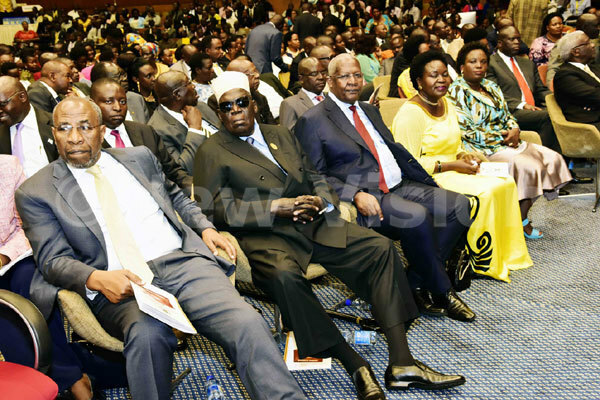
On interest rates, the president makes it clear that "I cannot guarantee lowering the interest rates for the traders. Those ones can continue suffering". He says the people he can guarantee lower interest rates are the manufacturers and farmers.
"So the borrowing for the famrers, for agriculture and for manufacturing will go down," he says.
_________________________________________________
5.34pm: 'Business cannot be as usual'
The finance minister brings his presentation to a conclusion by saying that "with the peace and security that has been guaranteed across the country, with the availability of reliable electricity and improved road and other infrastructure developments, the economy is set grow by leaps and bounds."
He says that to attain the middle income goal, "business cannot be as usual".
And with a few more closing comments, the ministers ends his presentation, drawing a huge applause from the large audience.
_________________________________________________
5.32pm: Wrapping up
The minister is keen to tell his audience that he is wrapping up. He goes on to detail the resource envolope for the financial year 2017/18.
Kasaija also offers an expenditure framework for the budget, indicating a breakdown of the allocation:
>> Sh3.577 trillion for Salaries and Wages
>> Sh8.325 trillion for Non-Wage Expenditure.
>> Sh11.349 trillion for Development expenditure, of which sh4.273 trillion is funded by Government and sh7.075 trillion from External financing.
>> Sh4.99 trillion for Domestic Debt refinancing sh757 billion for Appropriation in Aid.
______________________________________________________
5.28pm: Tax amendments
Income tax
The minister says that deductions for accelerated depreciation have been introduced as an incentive for businesses to invest upcountry.
And to improve compliance in rental income, he says "I will issue minimum rental charges based on location and value of properties".
Another reform is that the income of a Savings and Credit Cooperative Society is exempted to promote savings.
Value Added Tax
Among the reforms here are:
VAT payable on the taxable supply made to Government departments and agencies by a contractor executing an Aid funded project will be deemed to have been paid.
VAT on crop extension services, animal feeds and premixes, deep cycle batteries and composite lanterns, irrigation works, sprinklers and ready to use drip lines has now been exempted.
Interest on outstanding VAT and the penal tax is also limited to the principal amount similar to the Income Tax Act.
Excise duty
The minister says the Excise Duty Act has been amended to introduce specific rates equivalent to the current ad valorem rates on beer and soft drinks. "This will ease administration and reduce time and money spent in disputes, including the determination of taxable value," he says.
______________________________________________________
5.23pm: Tax compliance
In terms fo domestic revenue, the minister says that at only 13.8% of GDP, "our tax revenue effort is very low and inadequate to finance our development needs".
For that reason, we learn that government plans to boost domestic tax revenue in order to increase financing of the budget from domestic tax revenues.
"Accordingly, the Uganda Revenue Authority has been allocated additional sh90 billion to enforce compliance," says Kasaija.
"Revenue performance this year has been subdued as a result of slow economic growth. Tax collections for the financial year now ending are projected to amount to sh12,882.3 billion, against a budgeted figure of sh13,259.32, reflecting a shortfall of sh377.02 billion," we are told.
______________________________________________________
5.17pm: Citizen registration
Minister Kasaija: "The national identification has progressed successfully with 16.9 million citizens being registered, 14.8 million of whom have been issued with National Identification cards. This is critical in facilitating efficient delivery of public and private services, including financial services, mobile banking, social safety nets, and revenue collection among others. Next financial year registration of all citizens below 18 years and aliens legally resident in the country will be undertaken in order to support service delivery and enhance National Security."
He says that in order to improve efficiency and accountability in visa and work permit issuance, during the year, "Government launched the online E-visa and E-permit system to improve convenience for investors, tourists, students and other travelers."
Take note that monthly visa applications have now increased to 7,000 from 4000 applicants.
______________________________________________________
5.12pm: 120,000 cases for disposal
In improving governance, Kasaija says in the justice system, 98% of infrastructure to be built under the Justice Sector Strategic Plan have been completed and will be commissioned by December 2017.
In the next year, 120,000 cases are targeted for disposal for which 18 billion has been allocated to reduce the case backlog.
______________________________________________________
5.02pm: Social empowerment
The minister says government disbursed as much as sh75.4 billion to 10,321 projects under the Youth Livelihood Programme for the benefit of 130,306 youth, 45% of whom are female.
He adds that sh24 billion was distriibuted to 2,334 women groups with 29,762 beneficiaries to start or expand projects, in addition to the provision of skills training to improve management of their businesses.
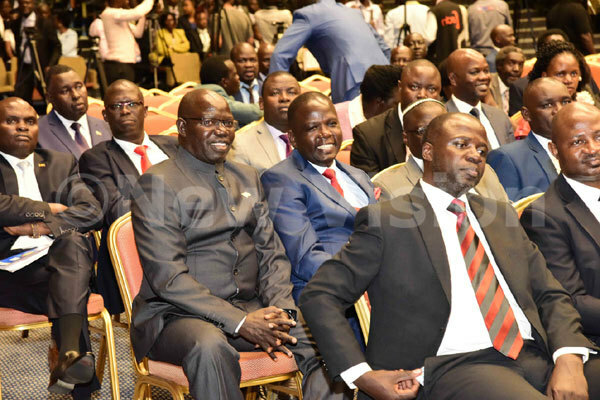
"In addition, 143,268 senior citizens in 40 districts have received the Shs 25,000 monthly grant under the Social Assistance Grant for Empowerment (SAGE) pilot programme, of whom 59.6% are female," says Kasaija.
We learn that sh67 billion has been allocated to finance 5,700 youth projects to benefit 68,400 youth under the Youth Livelihood programme as well as sh40.6 billion for about 2,000 women groups.
______________________________________________________
5.02pm: Safe water access rates still low
As regards access safe water nationwide, Kasaija says there has been marginal improvement, with rural coverage improving to 68% in 2016 from 67% in 2015. Urban safe water access also improved from to 74.5% in 2016 from 73% in 2015. However, these access rates are still below the NDP-II target of 100% by 2020.
He says the government plans to complete construction of Nakivubo and Kinawataka sewers; and the Kinawataka pre-treatment and pumping system.
"Construction of the Katosi Water Treatment Plant will also start," he says, adding that "I have allocated sh632 billion to the Water and Environment sector".
______________________________________________________
4.58pm: Education & sports
Kasaija says that during the past year, the universalization of education "has continued with primary school enrolment increasing to 8.8 million pupils in 2016 compared to 8.1 million in 2011".
He says: " Government fulfilled its pledge to increase Primary Teachers' salaries by 50%. Salaries of both teaching and non-teaching staff across all the public universities were also enhanced and arrears for non-teaching staff settled."
After offering more detail on the sector, the minister says he has allocated sh2.5 trillion for the education and sports sector.
______________________________________________________
4.55pm: Health: 'Progress over last 5 years'
The finance minister illustrates this with the following:
Infant mortality declined from 54 to 43 deaths per 1000 live births.
Maternal mortality has declined from 438 to 336 deaths per 100,000 births respectively.
The fertility rate has declined from an average of 6.2 to 5.4 children per woman.
Family planning has increased with the share of married women aged 18 to 49 practicing family planning rising from 30% to 39%.
Kasaija says in health infrastructure development, good progress has been made. He mentions Mulago Hospital extensive re-construction and equipping into a specialized facility which he says is expected to be completed by August 2017.
We learn from him that the project also includes construction of a new 320-bed Specialized Maternal and Neo-natal Health Care which is due for completion in June 2017.
The construction of Kawempe and Kiruddu Hospitals was completed and equipping is ongoing, adds the minister, who goes on to talk drugs and what government plans to do in the coming financial year.
He says the health sector has been allocated sh1.8 trillion.
______________________________________________________
4.53pm: More roads for paving
Minister Kasaija says that the stock of paved roads has increased from 3,317km in 2011/12 to 4,919km, "just only 1,081Km short of the 2020 NDP II target of 6,000km."
He says government will continue expansion of the paved national roads network and that roads will be constructed in support to commercial production of oil by 2020.
Kasaija also takes delight in mentioning that the World Bank has lifted suspension of funding to the Road sector.
Government prioritizes 10 oil Roads #UGBudget17-https://t.co/2FfBnYyogW pic.twitter.com/fahUnZWAwL
— New Vision UGANDA (@newvisionwire) June 8, 2017
______________________________________________________
4.48pm: 113 rural districts connected
The minister says that in the electricity sub-sector "significant developments have been registered" with electricity access increasing to 20.4% of households in 2016 compared to 11% in 2011. Construction works at the Karuma and Isimba hydropower projects are at 51% and 63% respectively.
And as regards rural electrification, 113 out of 117 districts have been connected to the grid.
______________________________________________________
4.44pm: Oil refinery
For the Oil and Gas sector, the minister says 98% of land acquisition for the oil refinery has been completed. Government is in the process of selecting a Lead Investor to partner with in the development of the refinery.
"Government, in agreement with the Government of Tanzania, selected the Hoima-Tanga route as the least cost route to transport Uganda's crude oil to the East African Coast," adds Kasaija.
______________________________________________________
4.39pm: More tourists, more jobs
For the tourism sector, the minister says Uganda is targeting tourist arrivals to increase to four million visitors per year, and double tourism earnings from $1.35 billion today to $2.7 billion by 2020. This will translate into significant jobs for Ugandans.
Stunning #MurchisonFalls! Site of the source of the #Nile to be revamped by #UGBudget17, #PearlofAfrica #travel pic.twitter.com/0oWPNce44L
— Sarah Kagingo (@SarahKagingo) June 8, 2017
______________________________________________________
4.36pm: Agriculture interventions
Minister Kasaija says sh39.6 billion has been allocated next year to increase the effectiveness of agricultural extension in improved delivery of the Operation Wealth Creation programme.
The minister adds that government will also continue demarcation of wetland boundaries.
He says solar-powered water irrigation systems will be established in all nine Zonal Agricultural Research and Development Institutes as a pilot before replicating and rolling out across the entire country.
And in order to encourage value addition to agricultural produce, "government will support investment in milk and other dairy products, oil palm, oil seeds and cotton", adds the minister.
He goes on in length on more interventions here.
______________________________________________________
4.33pm: Key sector performance
So how did the key factors perform in the 2016/17 financial year?
In agriculture, the minister goes in depth to explain what happened in this sector, saying that to improve market access, 11,000km of new community access roads were constructed, covering 90 districts and 158 sub counties; 77 rural markets were constructed in 35 districts; and 297 agro-processing facilities were established
______________________________________________________
4.29pm: Public service
And to make the public sector more efficient, the minister says among the things government will do is to amend the PPDA Act to eliminate delays in procurement, discpline negligent accounting Officers, build capacity across Government to improve project cycle management, among several other interventions.
______________________________________________________
4.23pm: Sh300bn to clear domestic arrears
But the sector also has challenges, which the minister is keen to highlight. These include limited access by to credit and its high of cost as well as low savings and absence of long term financing.
He mentions the interventions the government has in the pipeline, which includes the allocation of sh300 billion to settle domestic arrears.
Another is enhancing domestic savings as well as availing long term capital.
______________________________________________________
4.23pm: Developing the private sector
The minister says the private sector is a big player in production, trade, export promotion and employment creation and that as such "concerted efforts by the Heads of State of the Northern Corridor" has helped eliminate non-tariff barriers along the Corridor.
This, he adds, has reduced the costs of doing business and improving trade.
Economy grew at 3.9%, corruption now cancer #UGBudget17 -https://t.co/I8TwJQDjUN pic.twitter.com/C8Usu52qlf
— New Vision UGANDA (@newvisionwire) June 8, 2017
______________________________________________________
4.20pm: Agricultural exports
Agricultural exports:
Promotion of Agricultural Exports:
— Urban Television (@UrbanTVUganda) June 8, 2017
Unleashing Agriculture's potential can eliminate Ug's trade deficit currently at USD 2.8 bn.#UGBudget17 pic.twitter.com/PtmlDlYm7V
______________________________________________________
4.16pm: Primary sectors
The minister says the primary sectors where Uganda has competitive advantage are agriculture, tourism, minerals, oil and gas and goes on to outline the key primary secot challenges, including climate change and inadequate post-harvest handling infrastructure.
Other challenges he talks about here area the high cost of financing for agriculture enterprises as well as lack of coordination among institutions in the agriculture sector.
In the tourism sector, he underlines poor infrastructure among the challenges. In the Minerals sub-sector, the current problem is a fragmented legal framework which Kasaija says is "partly leads to low investment".
He then goes on to mention how goverment plans to intervene here.
______________________________________________________
4.12pm: Growth strategy on four pillars
The minister says that Uganda's economic growth strategy therefore rests on four pillars:
One, increasing production and productivity in the key primary growth sectors of Agriculture, Tourism and Minerals, Oil and Gas.
Two, industrialization through Value Addition.
Three, enhanced Private Sector Development.
And then increased Public Sector Efficiency.
______________________________________________________
4.12pm: The 2020 target
Agriculture . . .
Kasaija: Uganda's industrialization will be anchored on agriculture, agro-processing & value addition #UGBudget17 pic.twitter.com/jxt6ifKFBo
— WealthCreationUganda (@OWCUg) June 8, 2017
______________________________________________________
4.10pm: The 2020 target
On Uganda's future economic outlook, Kasaija says Uganda aims to graduate to middle income status by 2020.
"Average incomes, or GDP per capita will therefore need to rise to $1,039. Given a population estimate of about 41 million people by 2020, the size of the economy will need to grow by an additional $17 billion for us to attain that target.
______________________________________________________
4.08pm: Exchange rate 'broadly stable'
The finance minister says the exchange rate has remained broadly stable for much of the financial year, averaging sh3,532 to the US dollar.
He also says that inflation remained within single digit at 6.8% despite pressure from food crop prices.
______________________________________________________
4.04pm: Public debt 'sustainable'
We also get to hear from the minister that a sharp rise in interest rates in 2013 led to increased non-performing loans which peaked at 10.5% of total loans in December 2016, but have gladly reduced to 6.3% as at the end of March 2017.
The mninister also says Uganda's public debt is sustainable over the medium to long term.
______________________________________________________
3.59pm: Agric output slowed
We learn from the minister that growth in the country's agricultural output slowed to 1.3% this year compared to 2.8% in the previous year.
Here, he says the main reason was "unusually prolonged droughts".
The minister also says the industrial sector growth also dropped to 3.4% this year as against 4.7% last year, because of contraction in mining and quarrying activities.
The construction sector also slowed down, as did growth in the services sector.
______________________________________________________
3.57pm: 'Political budget'
Is it?
That is a political budget... Just promises and blind ambitions... #UGBudget17
— Brian (@bkyeyune) June 8, 2017
______________________________________________________
3.53pm: Factors affecting Uganda's progress
So what are the Which are the factors that have affected Uganda's economic and social progress, and may impact our future prospects?
The minister lists global factors, which include Slow economic recovery in Europe, the economic recovery in the USA and the rise in interest rates globally.
He also mentions Regional and domestic factors, including civil conflicts, climate change, high interest rates and non-performing loans and corruption.
______________________________________________________
3.51pm: The theme
The theme:
Kasaija: The theme for the Financial Year 2017/18 Budget is ‘Industrialization for Job Creation and Shared Prosperity' #UGBudget17 pic.twitter.com/Oapzxitngz
— State House Uganda (@StateHouseUg) June 8, 2017
______________________________________________________
3.49pm: Agricultural production and productivity
The minister says the Ugandan government Government plans to turn around the economy by enhancing agricultural production and productivity, as well as increasing the pace of industrialization.
______________________________________________________
3.47pm: 'A lot needs to be done'
The minister says that despite the previously mentioned progress, "a lot needs to be done."
He talks of how the per capita income has been growing "at only 2% annually compared with population growth of 3% per annum".
He points out growing unemployment, especially among the youth, and touches on the problem of prolonged droughts "as a result of partly environmental damage arising from the destruction of wetlands and deforestation."
Kasaija: "Land fragmentation is another challenge. Agriculture, the mainstay of the vast majority of Ugandans, is now at risk because of excessive reliance on rain-fed farming."
______________________________________________________
3.45pm: 'Longer life, literacy rate up'
Minister Kasaija, in his usual baritone, lists out some of the latest statistics, saying that many Ugandans are living longer and their lives are better lives.
He says the life expectancy today is 63 years, up from 48 years in 2002, adding that 79% of the population now accesses safe water compared to 59% over the same period (the latter drawing some murmurs from a section on MPs).
He also says that literacy rates for adults have rised by 6%, up from 68% in 2002.
He also shed light on improved immunization of children measles is now 82% up from 62% 15 years ago.
Kasaija says Per capita incomes in real terms have more than tripled to USD 773 in 2016 up from USD 250 in 2002, despite an increase in population from 26 million to 36.9 million people.
______________________________________________________
3.37pm: MINISTER KASAIJA READS BUDGET
Finance minister Matia Kasaija walks up to the podium, positions himself for what will be a long standing afternoon for him, clears his throat, and begins his address.
He starts off.
______________________________________________________
3.31pm: Speaker opens session
The Speaker of Parliament, who is the chair of this special session of parliament, makes her opening remarks, welcoming everybody in their respective capacity.
Meanwhile, she calls up the minister of works, Monica Azuba Ntege, to table the Civil Aviation Authority Amendment Bill 2017 before parliament.
______________________________________________________
3.27pm: Starting shortly
All rise as through the doors of the Victoria Hall and down the steps walk, first, Speaker Kadaga, followed by First Lady and education minister Janet Museveni and close behind President Yoweri Museveni.
They take up there places up at the front before the anthems are played and sang in unison.
Vice President Edward Kiwanuka Ssekandi is standing next to Prime Minister Dr Ruhakana Rugunda, who is standing next to First Deputy Prime Minister Gen Moses Ali . . . and the list goes on.
______________________________________________________
3.16pm: Ceremonial proceedings done
So now the proceedings have ended with a march past willed on by tunes by the Police Band. The president is led into the Victoria Hall as the other session of parliament is due to kick off.
I'll remind you that we are Serena Conference Centre today.
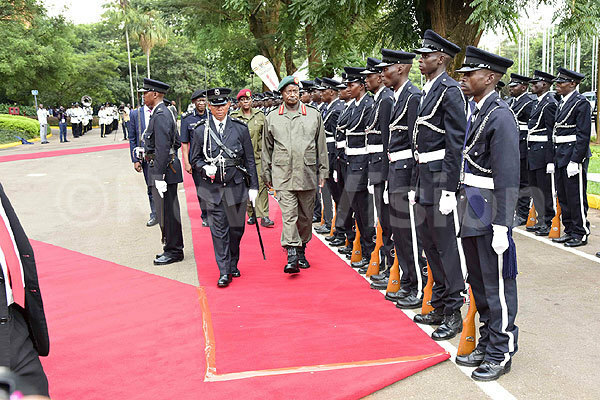
______________________________________________________
3.12pm: On corruption
Cissy Kagaba, the executive director of Anti-Corruption Coalition Uganda, shares her thoughts.
#UGBudget17 Corruption: Declaration of wealth for leaders won't water down the Vice- @kagabacissy ED Anti Corruption Coalition Uganda pic.twitter.com/SC1jns1o6p
— New Vision UGANDA (@newvisionwire) June 8, 2017
______________________________________________________
3.06pm: WB lifts funding suspension
And here's an interesting one . . .
#UGBudget17 @WorldBank lifts funding suspension of civil works of #Uganda's #NERAMP and #Albertine road projects https://t.co/ydjEqMZCYl pic.twitter.com/jAZdr1Khgi
— edge.ug (@ug_edge) June 8, 2017
______________________________________________________
|
2.56pm: PRESIDENT MUSEVENI ARRIVES The man everyone has been waiting for, President Yoweri Museveni, has arrived.
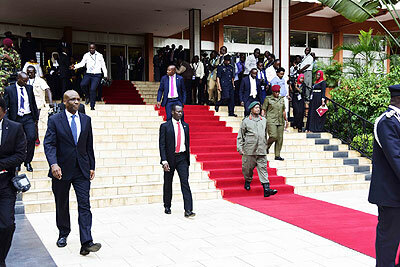
Next up, the ceremonial proceedings, including the playing of the national and East African anthems, the president inspecting a guard of honour and a march past.
|
______________________________________________________
2.53pm: 'Growth down, population up'
A panel of experts are discussing the budget at the Vision Group head offices in Kampala.
#UGBudget17 Fred Muhumuza Tr. @MakerereU Sch of Economics: Rate of growth has reduced yet the population is increasing pic.twitter.com/9borehLEqK
— New Vision UGANDA (@newvisionwire) June 8, 2017
______________________________________________________
|
2.50pm: SPEAKER KADAGA ARRIVES The Speaker of Parliament has arrived as the mingling goes on inside the Hall.
|
______________________________________________________
2.43pm: Coffee. Anyone?
We saw many of these disposable paper cups going around inside the Victoria Mall on Tuesday during the State of the Nation Address.

Well, that was for a very clear reason.
No-one wanted to become a statistic in the dozing department. Let alone, to be seen on national TV engaged in World War III with Mr. Sleep.
And of course it did work. Unlike in the past, we saw only a handful succumb to the 'nodding disease'.
We should expect the same today, I bet.
#UGBudget17 I really hope our honorables hold themselves together and don't dose off..glued @NTVUganda
— kats trever (@kats_trever) June 8, 2017
______________________________________________________
2.30pm: Watch every bit of it . . .
. . . on Urban TV
Follow the #UGBudget17 reading proceedings happening at @kampalaserena, all coming to you LIVE on Urban Television
— Urban Television (@UrbanTVUganda) June 8, 2017
TUNE IN Now!
______________________________________________________
2.21pm: Paying off a huge debt
As we wait for the president to arrive at Serena Conference Centre . . .
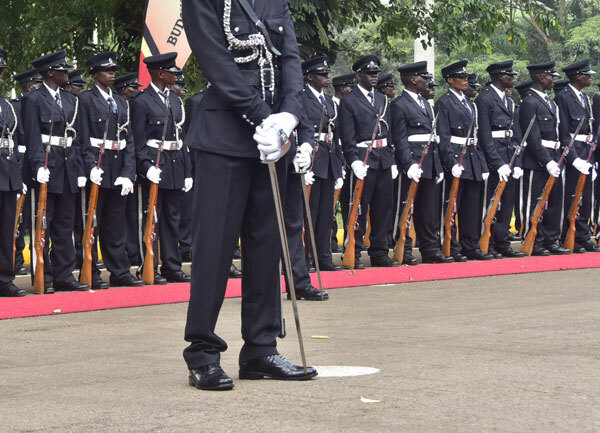
. . . let me tell you that the largest portion (35%) of the 2017/18 budget is going to debt repayment.
Debt repayment will take sh9.9 trillion, which is 35% of the total budget. The amount of money spent on debt repayment has been escalating in the recent past from sh6.5 trillion in the 2015/2016 financial year to sh7.7 trillion in this financial year and now at 9.9 trillion for the 2017/2018 financial year.
Meanwhile, the tourism, trade and industry sector will get sh98.3b, while the ICT sector has been allocated sh106.46b.
______________________________________________________
2.17pm: Empowering the youth
Here's one such voice:
#UGBudget17
— Kamugisha Blaise (@NC_NCPF) June 8, 2017
I hope as usual, Hon. Matia won't disappoint. But I'm interested in youth empowerment budget. @ntvuganda
______________________________________________________
2.12pm: An East African affair
By the way . . .
It's budget day in East Africa https://t.co/6IBhsz3apK #UGBudget17 pic.twitter.com/5LkyiwTsLh
— Kampala Dispatch (@dispatchug) June 8, 2017
______________________________________________________
|
2.03pm: MINISTER KASAIJA ARRIVES And here comes the man with that all-important briefcase.
|
______________________________________________________
1.55pm: What the minister will address
So what do you expect to hear from finance minister Matia Kasaija today?
To begin with, he will report on the state of the economy, and spell out the immediate and medium term strategies that will stimulate Uganda's economy and propel Uganda into middle-income status.
He will also update parliament on the performance of key selected sectors in financial year plus the priorities for coming one.
Kasaija will also highlight the revenue and expenditure framework and measures for the financial year 2017/18.
Well, in short, that's pretty much it. Only, he will do that in a whole lot detail!
______________________________________________________
1.50pm: Budget Day
We are some 10 minutes away . . .
. . . . meanwhile, Serena's Victoria Hall is filling up.
______________________________________________________
1.46pm: The theme
This time round, the theme is: "Industrialization for job creation and shared prosperity". Take note.
Remember that in his State of the Nation address on Tuesday, President Yoweri Museveni talked about the need to turn Uganda's young population into job and wealth creators.
______________________________________________________
1.39pm: Compare and contrast . . .
The statisticians might like something like this . . .
A graphical representation of budget allocation comparison between 2016/17 FY's UGX26.3tn & 2017/18 FY's UGX29tn #UGBudget17 #NBSUpdates pic.twitter.com/zy5hAITdh8
— NBS Television (@nbstv) June 8, 2017
______________________________________________________
1.34pm: Arrivals
We are closing in on the hour, and MPs, diplomats and guests are continuing to arrive at Serena. And one such arrival is Central Bank governor, Emmanuel Tumusiime Mutebile.
______________________________________________________
1.29pm: Stage definitely set
We return to Serena Kampala Hotel, where the State of the Nation Address took place two days ago, and the stage is surely set . . .
#UGBudget17 Carpet ready for this afternoon at @kampalaserena #CroozefmNews pic.twitter.com/KcuTCz7XV0
— WesternUg'zBiggest (@912CroozeFM) June 8, 2017
______________________________________________________
1.24pm: Lion's share
The budget we are focusing on today was approved by Parliament last week, and it came to our knowledge that the government has continued to prioritise the energy and transport sectors in its efforts to build a strong foundation for the economy.
The works and transport sector has been allocated sh4.8 trillion while the energy sector gets sh2.4 trillion.
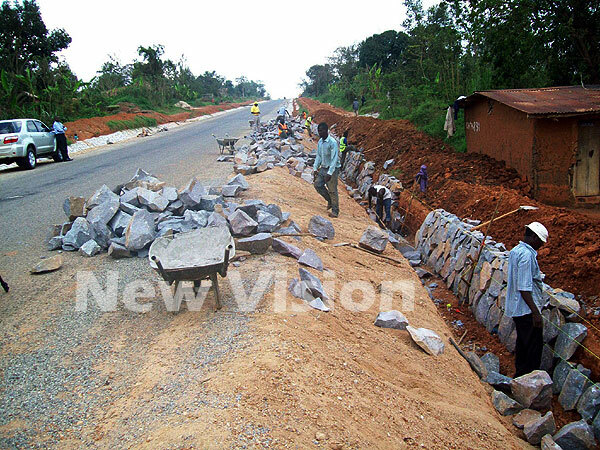
______________________________________________________
1.17pm: Asking the hard questions?
Can you help out on this one?
#UGBudget17 🤔 https://t.co/YYukddcwku
— Telma (@HiRolla1) June 8, 2017
______________________________________________________
1.10pm: Make that sh29trillion!
As mentioned earlier, finance minister will read out the 2017/18 national budget on behalf of President Yoweri Museveni. What I hadn't mentioned though is that this time it's a sh29trillion budget we are talking about.
Surprise, surprise? Nah!
Many of you might have known that way, way, way before today.
Well, the norm these days is that parliament will have approved the budget before it is read by the finance minister.
Following the enactment of the Public Finance Management Act in 2015, Parliament approves the budget by May 31. This means that Minister Kasaija has virtually no surprises to let out of the bag on Budget Day like it was the case in the past.
______________________________________________________
12.57pm: Bread. Cake. Whichever you like
Here's another way of looking at it . . .
How the national cake has been shared 🙈🙊#UGBudget17 #SOTNUG17 @CSBAGUGANDA @BSenfuka @Sambannz @wef @AHBNetwork @Ojilong1 @simbaradio pic.twitter.com/0QBLtnZnZK
— SRH- €ducation (@KasiitaMark) June 8, 2017
______________________________________________________
12.48pm: Sharing the lot
Most of the bread we buy reaches the shop shelves already cut, ready for us to count off slice by slice and slap on your favorite jam or peanut butter. But, what if it came as one big block of wheat and what-not, how would you share it around at home?
Or, what if the national budget was that very loaf? NTV's Raymond Mujuni gets down to some cutlery work.
If the national budget were a loaf of bread, here's how it would be shared..... #UGBUDGET17 pic.twitter.com/PTLK0g1rFk
— NTV UGANDA (@ntvuganda) June 8, 2017
______________________________________________________
12.44pm: Ready for the spotlight
Finance minister Matia Kasaija must be ready to soak in the limelight a little later.
Surely!
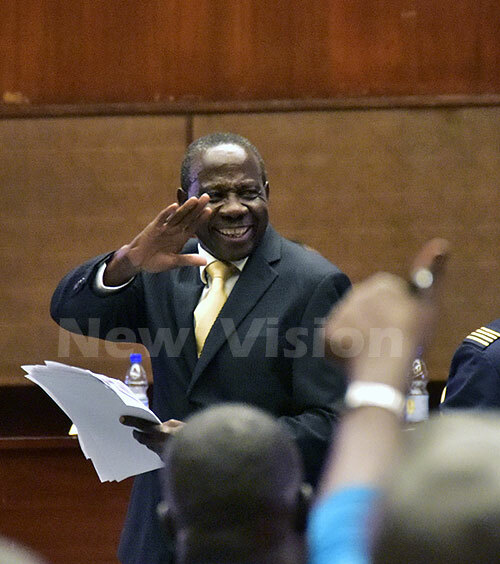
______________________________________________________
12.38pm: Budget reading
Later this afternoon, much, if not all, of the local focus will be on the national budget for the new financial year (2017/18). Finance minister Matia Kasaija is expected to present a bigger budget this time round to the parliament and the public.
This, he will do, on behalf of the president.
Proceedings are scheduled to start at 2pm Ugandan time. We will build up to that time.
So, with that said, allow me to welcome you to this live text commentary of today's budget reading.
______________________________________________________
12.35pm: Crunching numbers
Ithink, if ever there were a Numbers Day in Uganda, it would be today.

'Tis the time of the year when the experts get down to crunching numbers.
'Tis the season when Ugandans get to have an idea of where their nation is heading, economically speaking.
Budget Day is here!